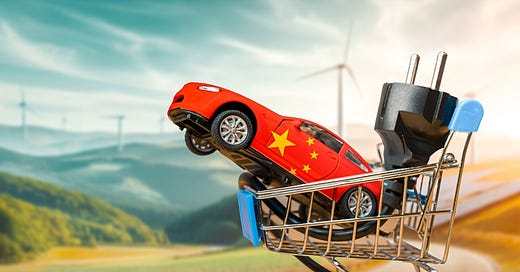“The non-stop government spend-a-thon leads to waste, malinvestment, corruption and inflation.” -Fred Hickey
“Strange days have found us.” -The Doors
“I don’t want to focus too much on Tesla as I understand there are quite a lot of folks enamoured with its leader, but why bother owning the ‘best’ company in a terrible industry?” -Kevin Muir
Undoubtedly, Haymaker readers feel I have a weakness for cheap stocks and bonds. Naturally, I prefer the “term” undervalued. A perfect case in point right now could, arguably, be the auto stocks.
Stellantis — the manufacturer of Chrysler, Fiat, and Peugeot — is the ultimate example of such cheapness… make that, undervaluation. It trades at a mere three times earnings.
Normally, after several years when demand for new autos has been running below the long-term average, and with the Fed’s tightening campaign having reached its sell-by date, I’d be an auto bull. But, using those always perilous words when it comes to investing, this time is different.
The main difference maker is what I’ve long referred to as The Great Green Energy Transition. Per this week’s Guest Haymaker, featuring one of my absolute favorite financial scribes, MacroTourist author Kevin Muir, is precisely on that topic.
Because this note is on the longer side, I’ll keep my introduction very brief. (Please hold your applause!). We’ve also provided some highlight passages for those who want a quick overview.
But I can’t resist opining on Kevin’s views on TSLA. Since those lean bearish, you can easily imagine I find those particularly brilliant. In my view, Mr. Musk’s flagship company is taking on serious water. While I could be as misguided as one of TSLA’s self-driving vehicles, I believe its shares are heading to $100 later this year… if not to double-digits.
A key reason is what Kevin brings up regarding China’s version of TSLA, BYD. As you may know, that has long been a favorite investment of Berkshire Hathaway. That unusual offshore foray was due to his late, great, partner, Charlie Munger. It was Mr. Munger who sold the Oracle on BYD’s potential back in 2008. Despite that BYD’s stock has fallen sharply from its 2022 apex, Berkshire’s initial $230 million investment is worth nearly $4 billion today. (Despite that, and huge win on Apple, Berkshire’s stock portfolio has actually slightly lagged the S&P over the last 20 years.)
Yet, as you will read, even mighty BYD is struggling. The fact that there are some 90 other EV producers in China might have something to do with its travails. As Kevin notes, an industry that was already drowning on overcapacity is now at risk of “swimming with the fishes”, as mobsters like to say about their victims. Consequently, the mortality rate of automakers, for both EV and traditional internal combustion engine (ICE) producers, may be poised to approach that of the few remaining members of the Greatest Generation.
Frankly, his main points have me rethinking two areas I’ve been bullish on: bonds from Ford and GM, as well as oil stocks. The first is self-evident but the second requires a bit of dot-connecting. My nascent concern is that if EVs are going to be dumped en masse on the market, that logically will reduce the demand for ICEs. Because of steep tariffs in America, the former Land of the Free Trader, it’s not as much of a risk here. But emerging markets (EMs) have been where the strongest growth in oil demand has occurred for well over a decade. And that’s where Chinese EV exports are truly exploding (hopefully, not literally, which in the case of lithium batteries is not that much of a pun), as you can see below.
In both China and America, there may be no more graphic example of government-orchestrated misallocation of capital than with EVs. Of course, that’s never kept them from sticking with bad plan, even after its myriad flaws have become too obvious for consumers — and markets — to ignore.
David “The Haymaker” Hay
SELL THE AUTOS: SERIOUSLY, JUST TAKE THEM OFF YOUR SCREEN
The 'tourist walks though why he thinks this industry will struggle for years to come
Kevin Muir






